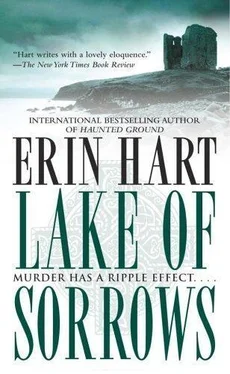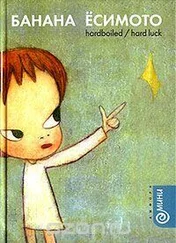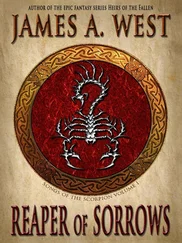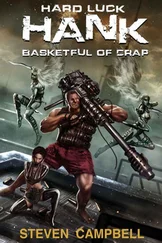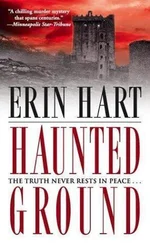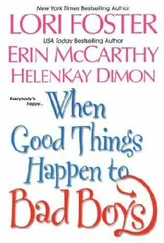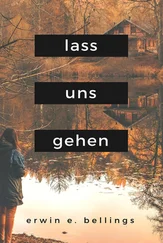Ward looked into the bathroom mirror, settling the knot on his tie and checking the plaster on his throat one last time before leaving the house. He was curious about this new body at Loughnabrone. He’d been out there a few days earlier, along with Catherine Friel, the new assistant state pathologist, who had been making a determination on another set of remains. He was glad that she would again be attending. He’d worked with Malachy Drummond many times, and they got on well, but he had only met Dr. Friel the previous week. He’d felt an immediate lift at the warmth and the acute intelligence in her eyes, and the slight frown of concentration that had furrowed her forehead as she worked. He hadn’t felt anything similar in years—didn’t even know how to describe it, except as a sort of forward momentum of the spirit. He hesitated for a moment at the bedroom door, then crossed back to the chest of drawers, where he removed his plain gold wedding band. He held it in his fingers, feeling the warmth and the weight of it, and finally set it in the shallow tray on top of the bureau.
Cormac heard the wind, and looked up from his work to see the leaves on the chestnut trees outside tremble in the stiff breeze. He hoped Nora was getting on all right out at the bog; he remembered what a strong wind could do to all that loose peat. He had urged her to come out with him, the night before she was to begin work on the excavation, but she’d insisted on getting up early and making the trip alone this morning. She needed time to think, she’d said. He had detected a slight pulling away in her recently, a greater detachment in the way she looked at him, a new tinge of sadness in her eyes. There was definitely something going on, something he was not privy to, and the thought disturbed him.
They’d never gone away for a proper holiday, and this hardly qualified. When he’d discovered that Nora was coming down for the excavation on the latest bog find, he’d arranged for them to stay at the McCrossans’ cottage, which was only a short distance from the site. He was on deadline to finish an article, and the solitude afforded by this place would be ideal. But he had an ulterior motive as well, to try to clarify where he and Nora stood. He understood her reluctance to be drawn into anything serious. He’d tried not to read too much into her reticence. Maybe she had just had a lot of things to attend to before leaving Dublin. There was always work to do for classes, or her own academic work to catch up on at weekends. He sensed something terribly temporary about every aspect of Nora’s life—the job, the flat, even her studies—and from the way she’d been behaving lately, he’d almost begun to feel as if he might be one of those temporary arrangements. Everything might carry on just as it had been, on and on. The trouble was that he didn’t know whether that was quite enough.
He looked around the little house, where his old teacher and mentor Gabriel McCrossan had come every summer. Twenty years ago, Gabriel had started spending so much time out here, working on bog road excavations and living in somewhat shabby rented accommodations, that he and Evelyn must have thought it practical just to buy a house, so at least they could have more time together. The cottage was small and compact, and despite having been completely fitted out and modernized, still carried the atmosphere of age in its low ceilings, gray flag floor, and deep-set windows. The place was not distinguished in location. There was no breathtaking view, only wild bog and small hills, no doubt the remnants of ancient monuments long since plowed under. A bland place, most people might think, and yet some of Ireland’s greatest treasures still lay beneath these bogs. Gabriel had been the first to bring them to the nation’s attention. These treasures were not precious metal, but planks of rough, hand-hewn wood, the wordless annals of the Iron Age, and with them a fuller portrait of a whole society had begun to emerge.
Evelyn rarely used the house now, since Gabriel’s death. A month ago, she’d asked Cormac to dinner, and announced that she’d made a will leaving the house to him, and that he ought to consider it his own. She’d handed him a key, the same one he’d used to let himself in last night. He’d been so touched by her gesture that he hadn’t quite known what to say.
“Just say you’ll make good use of it,” she had advised. “I’d hate to see it empty and lonesome. Take Nora down for a few days.”
When this opportunity to stay in the cottage had presented itself so serendipitously, he’d quickly phoned Michael Scully, the old friend and neighbor who had always looked after the house for the McCrossans when they were in Dublin. Evelyn had warned him that Michael’s health was declining, though she hadn’t been specific. But he’d seemed happy to have them coming down for a few days, and had sent his daughter to remove the dustcovers, wash the windows, and sweep out the cobwebs and the cold ashes. She had still been in the house when Cormac arrived. When he’d stepped into the kitchen, Brona Scully—a slender, doe-eyed girl of about twenty—had retreated to the corner beside the dresser and stood frozen, like a hare convinced that immobility would render it invisible to predators. He’d tried speaking to her, but got no response; and when he came back from inspecting the rest of the house, the girl had vanished without making a sound. Cormac didn’t know her background well, only the story—perhaps just a rumor or local legend—that as a child she had witnessed her sister’s suicide. Whether or not the story was true, it was a fact that she had not spoken a word since that day.
Cormac could feel his friends’ presence strongly here: Evelyn in the colorful tapestry cushions and all the other things that made the house comfortable, Gabriel in the worn leather armchair by the fire, and both of them in the hundreds of books that lined the walls. He had been the anchor around which her energy swirled. To Cormac their union had always seemed a near-perfect balance: strong individuals married together to make a separate entity greater than either of them alone, a mystery unfathomable even to themselves. The deference they’d invariably shown each other used to calm him when he felt anxious. He remembered the way Gabriel sometimes used to catch Evelyn’s hand when she passed by. He had always felt embarrassed but also fascinated by the tenderness between them.
He sometimes imagined that he could feel the same way about Nora as Gabriel had about his wife. Evelyn had come here, to a place not known for its amenities, and made a home for herself and Gabriel, amid the bogs that were his life and his passion. Cormac knew he wasn’t Gabriel, that he could never be half the intellect, half the scholar, half the man Gabriel had been. He couldn’t ask Nora to come with him to this remote place. She had her own work as well, with a different center, a life that was not his life.
It wasn’t just that his work was here. He’d spent the past year trying to create a bridge with his long-absent father, now an old man retired from the world, living at his home place up in Donegal. It was not an inconsiderable thing for a man to know from whence he came. It was Nora who’d convinced him to keep trying, though the going had been rough at times.
It suddenly struck him that it was in this house that he had first heard her name. He’d been down for the weekend with the McCrossans, and Evelyn was already asleep. He and Gabriel had stayed up late, waxing philosophical over a few large whiskeys, and Gabriel was becoming more than usually sincere. Others might become uncoordinated, or belligerent from strong drink, but with Gabriel, utter sincerity was always the best indicator that he’d achieved a slight state of inebriation. He heard the old man’s voice: There’s someone I’d like you to meet. Nora Gavin is her name. I think you might get on. Cormac remembered protesting, as he usually did when any of his friends tried a hand at matchmaking. But Gabriel had persisted: She’s lovely, very intelligent, and she has a fierce good heart. And you need someone, Cormac, someone to get your arms around at night. Believe me, it makes all the difference.
Читать дальше
